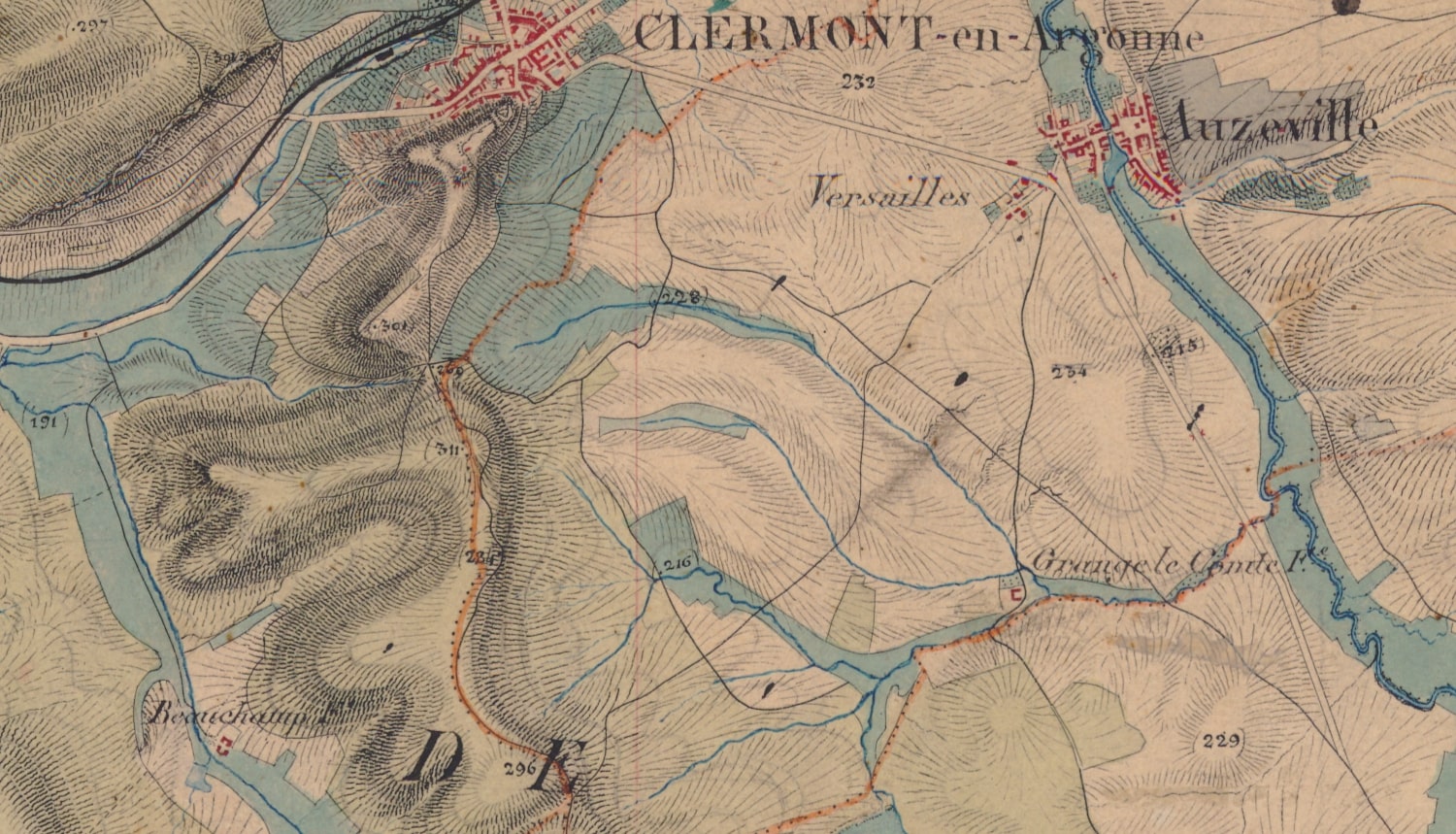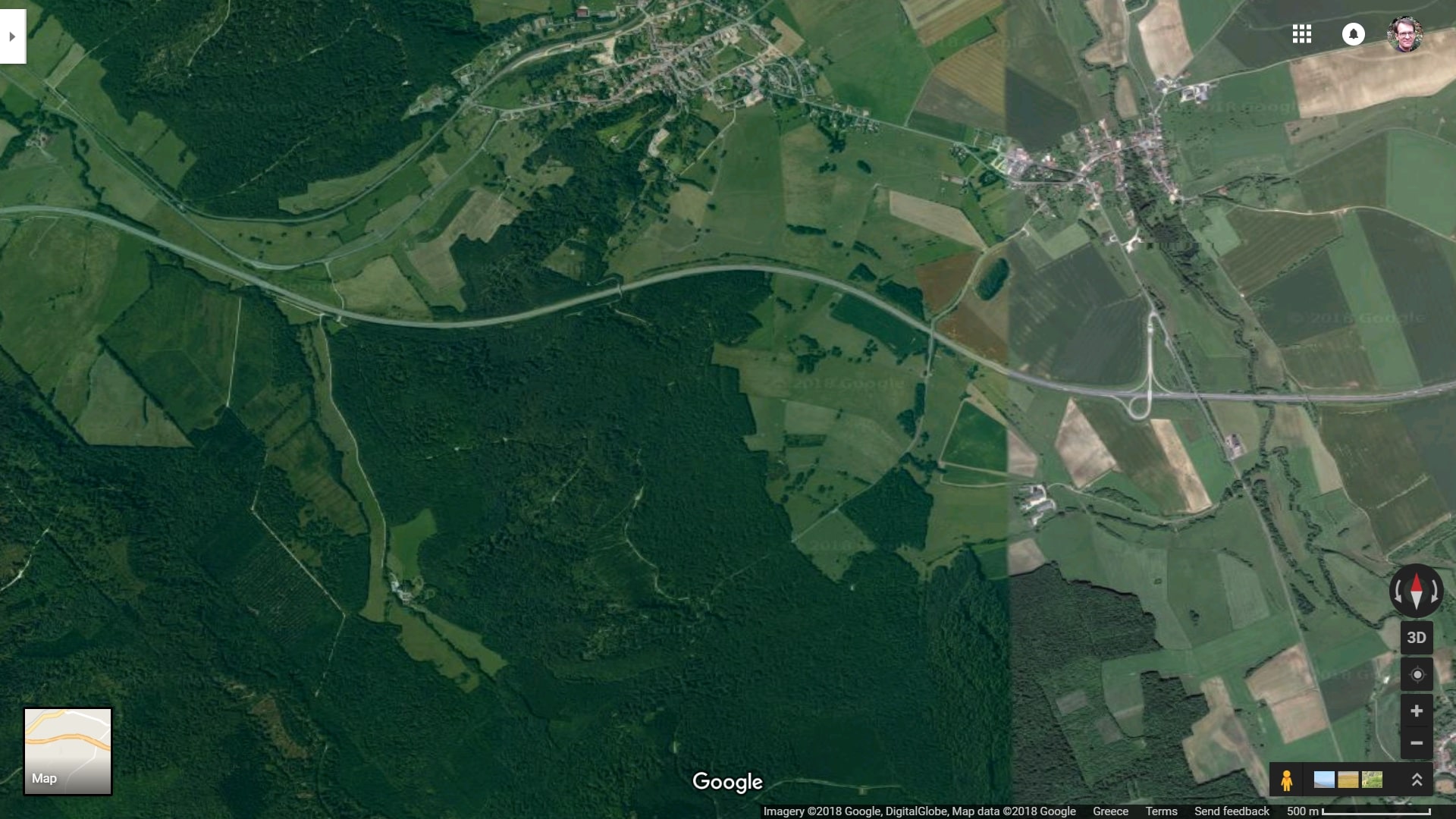“One day they came upon a building during a rain storm, and the guys wanted to seek shelter there. The captain forbade them from entering, so they slept in the field that night about 100 yards away. In the middle of the night, the building was destroyed by an artillery shell, and Ben received a dent in his helmet from what he thought was a piece of wood.”—Bruce Potts
September 15, 1918, the 35th Infantry Division moved during the night, as all movement now must be kept secret from enemy surveillance, into the Charmentois area on “motorbuses.” Kenamore describes the vehicles as, “…those immense lumbering cars which were stripped from the streets of London and Paris at the beginning of the war, and which had rambled all over the North of France since, hauling soldiers to many threatened fields carrying wounded back and at times playing the part of trucks and taking supplies forward.” (72)
Maybe Benjamin Potts and his buddies made jokes and pretended to be tourists, tipping their helmets back, pointing out the windows, imagining a more lovely landscape beyond the darkness.
“My goodness, Henrietta, have you ever seen such beautiful scenery?” says one soldier.
Another replies in falsetto, “Never in my life, George. I’m so glad you convinced me to go on vacation in France!”
“Most folks prefer the south of France,” says another, “but I must say the north is more to my liking.”
And still another, “All this site-seeing makes a man thirsty—Garse-on, une beer, see-voo-play!”
Maybe they all had a good laugh. Maybe they slept.
“At this stopping place [Charmentois], which was also out of doors, the air bombs became more frequent.” (Kenamore 72)
From Charmentois, “The Sixty-ninth Brigade [including Private Potts’s 137th Regiment] moved up near Auzeville [oh-zay-veel] on the night of Sept. 19-20, and the next night the remainder of the division went to the neighborhood of Grace-le-Comte (sic) Farm and into the woods east of Beauchamp, where the division relieved the Seventy-third French Division in charge of the sector.” (Kenamore 72)
This movement was on foot. On the front now, the 35th was in range of artillery fire, and enemy planes made nighttime bombing raids over the countryside. The night of September 19 may be the earliest occasion for an officer’s order, a soldier’s discipline, and Private Potts’s steel helmet to take the dent in place of his skull.
I wonder, if it had happened differently, in what body would my soul now inhabit?
 Portion of a map, La carte d’état major, 1866, showing the area around Auzéville, France, including Grange-le-Comte Farm (right) and Beauchamp (left)
Portion of a map, La carte d’état major, 1866, showing the area around Auzéville, France, including Grange-le-Comte Farm (right) and Beauchamp (left)
In the following current satellite image, Auzéville, the farm, the woods, and Beauchamp appear unchanged; perhaps a destination for a future pilgrimage.
 Current satellite image
Current satellite image
Imagery ©2018 Google, DigitalGlobe, Map data ©2018 Google
My great grandfather, like many veterans, didn’t talk much about his wartime experience. His family has only his discharge paper and a few anecdotes.
One hundred years later, I’ve discovered a few documents that bear his name. From draft registration to discharge, I’m following the paper trail of B. F. Potts’s journey to the battlefields of the Great War in France and back home again.
Previous articles:
“Well, Daddy, what did you think about France?”
“It's a very muddy place.”
Benjamin Franklin Potts Registers for the Draft
As the Great War thundered across the fields of northern France, ten million American men, ages 21 to 30, signed their names to register to be drafted into military service.
Military Induction and Entrainment
“I, Benjamin Franklin Potts, do solemnly swear to bear true allegiance to the United States of America, and to serve them honestly and faithfully, against all their enemies or opposers whatsoever…”
“If it moves, salute it. If it doesn’t move, paint it!”
Embarkation, the Tunisian, and the Bridge of Ships
In his first ocean voyage, B. F. Potts crossed the submarine invested waters of the North Atlantic in a convoy of steamers escorted by a warship.
Enterprise, Tennessee: The Town That Died
Grandpa owned matched pairs of horses. Him and the boys [Ben and his brothers] cut and snaked logs out of the wood to the roads. He got a dollar a day plus fifty cents for the horses.
Rendezvous with the 35th Infantry Division
“Some of the guys disobeyed orders, went into the town, broke into a bakery, and stole all the bread and baked goods…”
The battle of Saint-Mihiel (September 12-15) would be Pershing’s first operation as army commander. He assigned the 35th to the strategic reserve, whose purpose is to replace a weakened unit or to fill any gap in the line created by the enemy.
“Private Potts, how tall are you?”
The soldier, looking into a button of the captain’s coat, says, “Five foot three, sir.” The wide brim raises.
Next date:
September 24—Planning the Meuse-Argonne Offensive